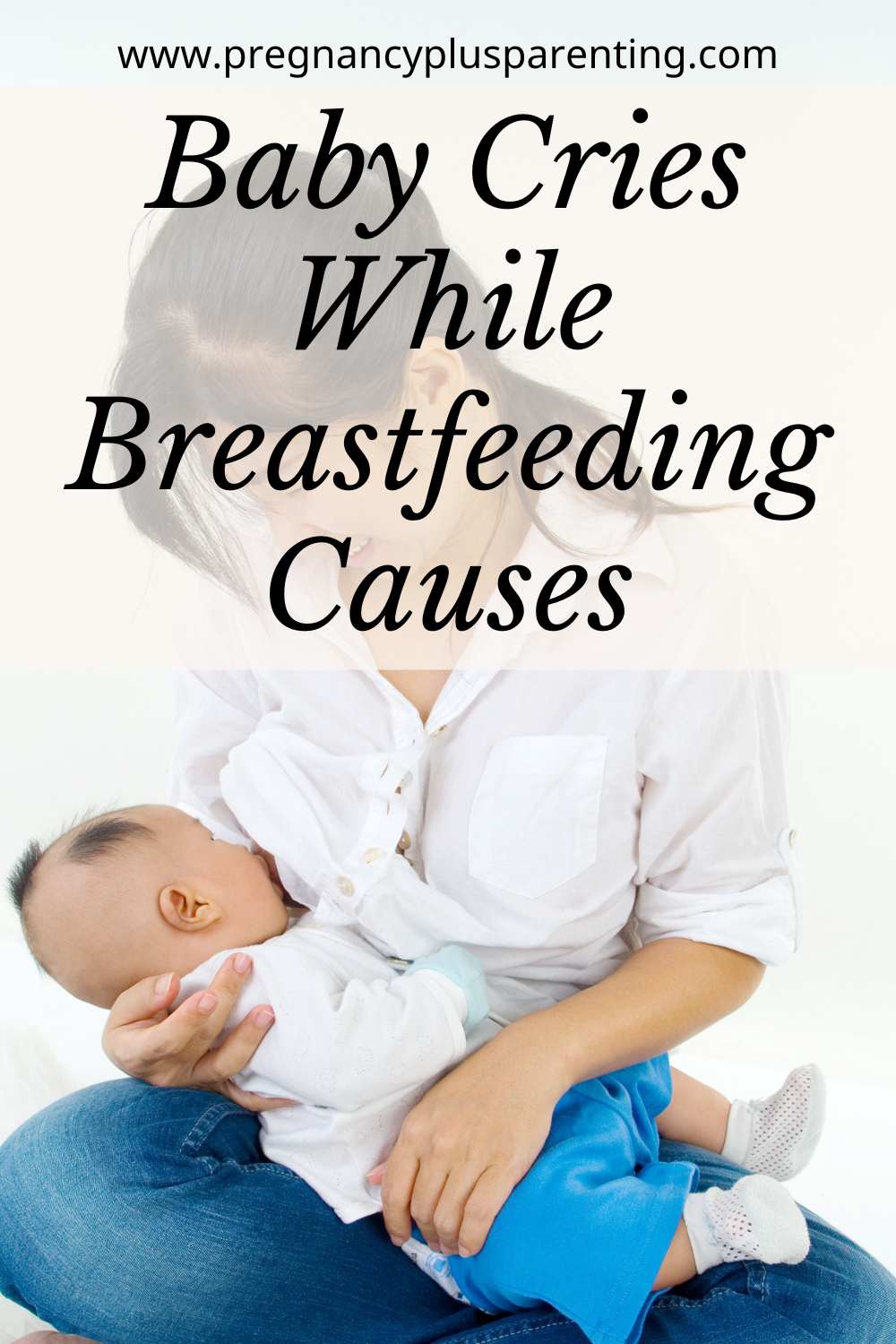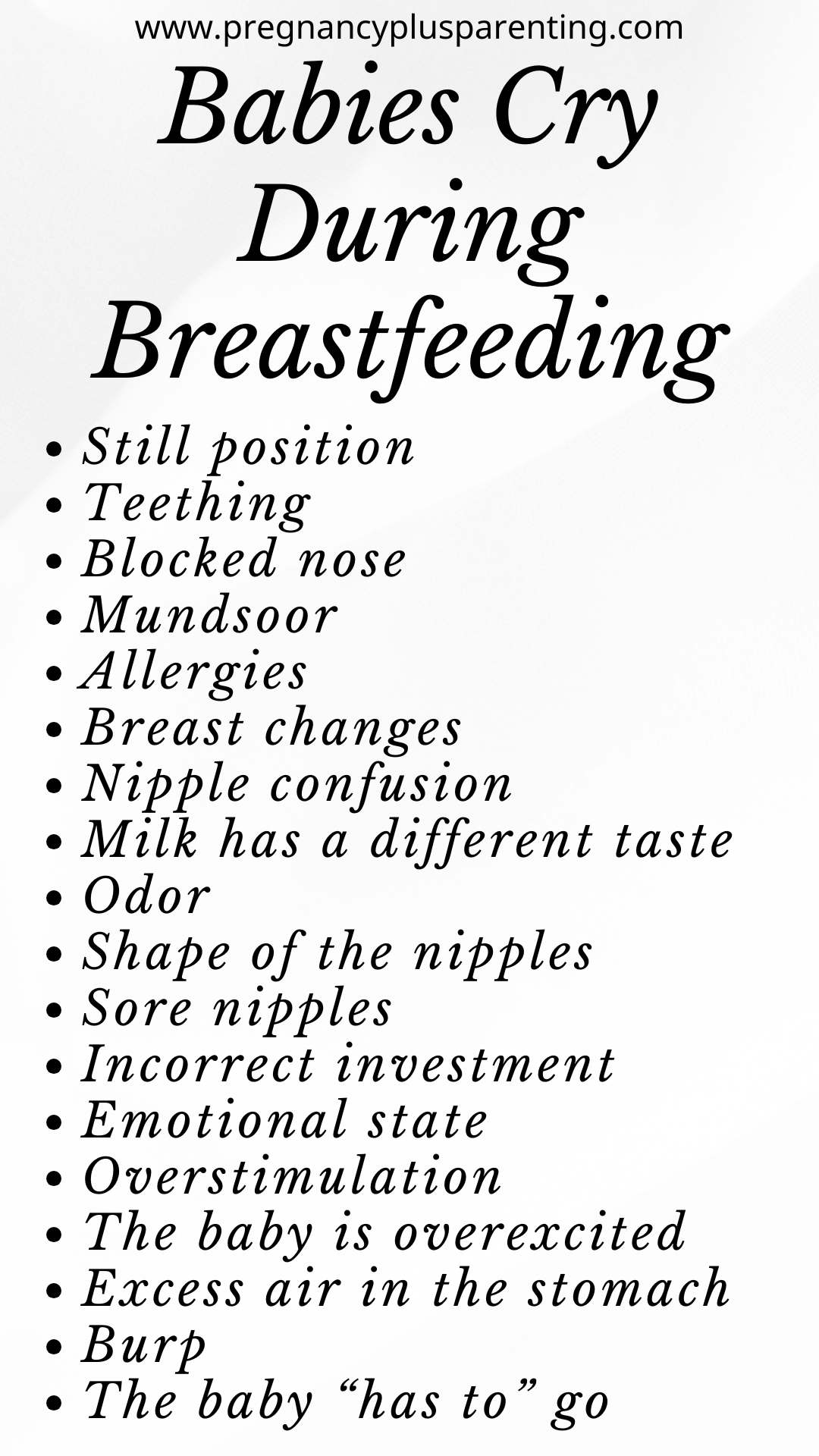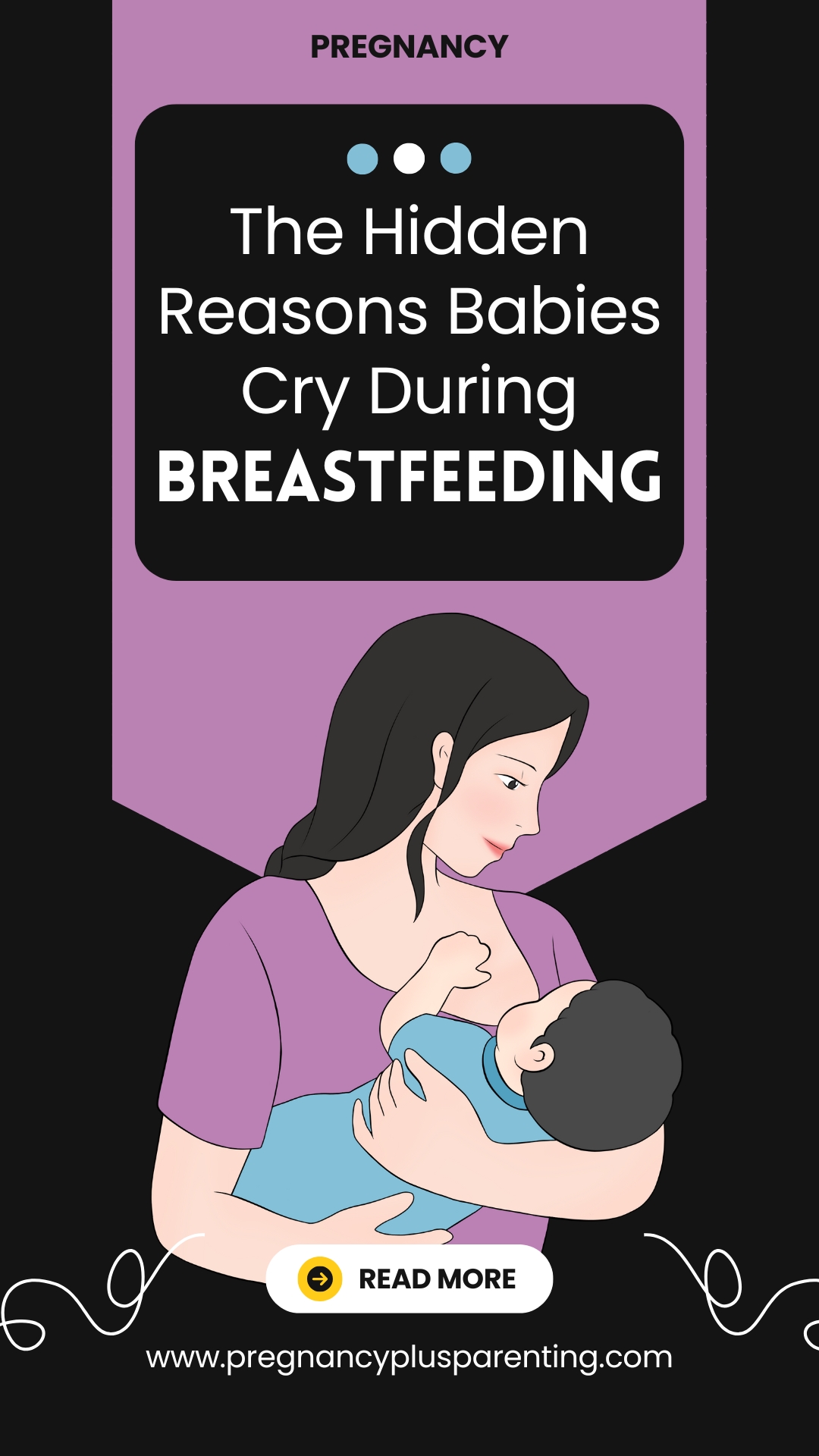The Hidden Reasons Babies Cry During Breastfeeding
Breastfeeding and the breastfeeding period is the most beautiful time in which mother and child have and maintain a very close relationship with each other.
Many people imagine such a symbiosis, but what if it doesn’t work out so perfectly?
The baby cries while breastfeeding!
The baby cries after breastfeeding!
The baby is restless and whiny and refuses the breast .
My baby suckles all evening and is fussy. What’s wrong with the baby?
Maybe I don’t have enough milk or my milk isn’t good enough?
Do I have to supplement it with a bottle ?
Why does my baby cry when I breastfeed him ?
These are eternal questions and breastfeeding problems that almost every mother has dealt with at least once during breastfeeding.
Because such scenarios do exist and can push even the most patient and consistent mother to her limits.
There are always periods when the baby literally cannot be separated from the breast and since being a mother is a lot of work in itself, most people are at a loss when the breast-shaming phase sets in and you, as a mother, have to deal with your crying baby alone.
During this time, many mothers think that breastfeeding is no longer working and that they do not have enough milk and that is why their baby is hungry, constantly cries, screams and is restless.
Unfortunately, this is also the most common reason why so many mothers stop breastfeeding early and start using a bottle.
Even though you may be feeling unwell and think that you don’t have enough milk or perhaps you have bleeding or sore nipples ?
Does breastfeeding hurt you and your baby likes to bite?
Are you fed up with being the sole breadwinner?
But then you feel guilty and you’re sad again?
Don’t worry, that doesn’t make you a bad mother; even if you decide to wean , you’re still a good mother.
But if you haven’t decided yet and are looking for a way out and are ready to try it out, then I would like to encourage you and go on a search with you to find out what is currently bothering your baby.
With a little patience and persistence, you can overcome the discomforts of breastfeeding.
A breastfeeding consultation, where you get advice from a good lactation consultant, can help you and your baby experience all the wonderful aspects of breastfeeding and, what’s more, your baby will be able to enjoy all the valuable and healthy benefits of your milk.
There are many women who stop breastfeeding early and there is nothing wrong with that.
There are also those who stopped breastfeeding early with their first child and then enjoyed breastfeeding with their second because they felt more secure.
It’s no wonder that when a first-time mother has so much to deal with, she feels insecure and sad during breastfeeding and chooses the easier way out, namely weaning.
Unfortunately, the environment can also lead to the new mother giving up breastfeeding quite early because she does not receive support for her breastfeeding problems and answers to her questions.
It is important that there is help available and you can get it before you decide against breastfeeding.
After all, there is a lot at stake, namely the healthiest liquid available for your baby in the first few months of life.
In addition to breastfeeding counseling, you can also opt for a breastfeeding group where experienced breastfeeding counselors are available to share their knowledge.
In addition, you can exchange experiences and advice with other mothers in a breastfeeding group and realize that you are not alone with all of these problems. Even if some breastfeeding mothers make it look so easy, every woman struggles with her own problems and obstacles when breastfeeding.
Breast milk is not only nutritious, but also strengthens the baby’s immune system and is the best thing a baby can eat in the first few weeks. Mothers who breastfeed have the advantage that the involution of the uterus and other body parts is accelerated. It has also been proven that mothers who breastfeed lose weight much more easily than mothers who do not breastfeed.
Babies are born with the sucking reflex, that’s true. But that doesn’t mean they’ll be able to properly breastfeed once they’re born.
It simply takes time for the baby and mother to get used to each other and for breastfeeding to develop in a way that allows both to enjoy the benefits.
What you see as normal breastfeeding behavior may be something your baby sees completely differently and that is why he or she becomes so restless.
Newborns have to learn how to breastfeed and it can take a while until they can open their mouths properly and take the nipple into their mouth and get to the milk.
There are babies who suckle for a short time and then stop, then start sucking again and then take a break, even take a short nap and then continue sucking again.
There are also those who suck very quickly at first and then they become restless and suck at intervals.
Everything is considered normal breastfeeding behavior as long as the baby has enough “full diapers” daily and is thriving.
If the baby does not have regular breastfeeding sessions, a baby sling can be a great help.
You can carry the baby on your bare skin so that he or she always has access to your breast and can breastfeed whenever he or she wants.
While the baby is in the sling, you can move freely and carry out your daily tasks instead of sitting on the bed with the baby in your room and despairing.
All you have to do is find the right way to carry your baby so that he or she is at the same height as your nipple and can latch on whenever he or she wants.
The all-day skin-to-skin contact and unrestricted access to the nipple and breast milk will have a very positive effect on breastfeeding and you and your baby will definitely build a secure foundation for a close bond .
Another possible reason for the baby’s restlessness could be that it is not yet hungry or that it is still awake enough and too excited to drink.
The skin contact will do him good and if he is interested in the breast, he can start sucking right away.
Even if breastfeeding and the breastfeeding times have become established and you and your baby have established a fixed rhythm, breastfeeding strikes, also known as the breast resentment phase, can still occur again and again.
An uncomfortable or unstable breastfeeding position can also be the cause of the baby’s restlessness.
In some breastfeeding positions , the baby lacks support or is far away from the mother and the innate search reflexes disturb the baby instead of helping it find the breast.

Baby cries while breastfeeding – causes
Still position
In unfavourable breastfeeding positions, the breast is grasped superficially and the baby feels unstable, which in turn leads to ineffective breastfeeding.
Breastfeeding becomes painful for you and the baby is also frustrated because it cannot drink undisturbed.
Reclining breastfeeding positions are much more recommended than upright ones because the baby lies directly against the mother’s body, feels stable and can drink undisturbed and effectively thanks to innate reflexes.
The reclined breastfeeding position is also very comfortable for you and breastfeeding works perfectly.
For other mothers and babies, the side position is the most popular and comfortable position for breastfeeding.
You will both find out which breastfeeding position is best for you and your baby, and nursing pillows or blankets can be of great help.
What else can be annoying when breastfeeding:
• The distance between you and your baby may be too large if your baby is lying with his body on a nursing pillow.
• The baby’s lower lip and chin are too far from your breast – here you should hold your baby closer to you.
• Your clothing, nursing bra or baby clothes can also be a distraction – it is best to take off the clothing and anything else that is distracting while breastfeeding.
• Pressure against the baby’s neck and back of the head or face – here it helps if you hold the baby between your shoulder blades to give him support without suffocating him.
• The baby may need to bend forward to reach the breast – here it helps if you pull your baby down gently by the legs, as it is helpful if the baby’s head is slightly on the neck.
• The baby is lying twisted or the arms are between you and the baby – in this case you have to lay the baby so that their stomachs are against each other.
• Perhaps your breast is too heavy and gravity is pulling it down, preventing the baby from reaching the nipple – The nipple is ideally positioned when it is under the baby’s nose.
It is helpful if you hold the breast with your hand or support it with a pillow or gauze cloths (towels).
• Breastfeeding can also be awkward if your upper arm is too close to the nipple – your baby feels restricted and doesn’t have enough space around your face. Changing your breastfeeding position can be helpful.
• Incorrect and uncomfortable breastfeeding position – Your baby may have outgrown the usual breastfeeding position that has worked for them until now.
Now you need to find one that fits so that the nipple is directly under the nose and the baby is still comfortable.

teething
Teething can also be one of the reasons why a breastfeeding strike has occurred.
Maybe your child feels the first teeth growing and is therefore restless while breastfeeding.
There are teething gels that offer soothing relief from teething problems.
Many midwives and mothers swear by its effectiveness and recommend using the gel with its pleasant taste for babies during teething.
Even if it is only a teething gel, please only use it in consultation with your pediatrician.
Blocked nose
A stuffy nose can be the cause of a cold. Colds are not uncommon in infancy and can certainly trigger a breastfeeding strike.
Here you can help your baby by helping him to clear the nose of excess secretions so that he can breathe freely and therefore drink much more easily.
In addition to many home remedies, you can also get help with a nasal aspirator or even nasal drops.
Before you resort to nasal drops, please consult your pediatrician first.
It may also be possible that the baby may experience pain while breastfeeding and may suffer from an ear or middle ear infection.
In this case, a visit to the doctor is definitely necessary.
Mundsoor
A yeast infection (oral thrush) can also cause pain in the baby when breastfeeding and be a reason for the crying phase.
Crying, screaming and refusing the breast are the most common symptoms of a thrush infection, where the mother is usually also affected.
Allergies
An allergy to certain ingredients in breast milk that the mother has ingested through her own diet can also cause the breastfeeding strike.
Here the baby starts to drink calmly, but as soon as the breast milk reaches the stomach, it becomes restless and starts to cry.
Your baby may have an intolerance to certain foods you eat.
Cow’s milk protein is usually the culprit here. If you suspect this, you can try avoiding cow’s milk and dairy products for 7 to 10 days to see if the situation improves.
You can also use this method of elimination with other foods if you think they are causing discomfort while breastfeeding.
If you suspect certain foods may be harmful to your baby, such as nuts or raw eggs, you can definitely use this to clear up any doubts.
Breast changes
Your breasts will change during breastfeeding.
After a few months, it will no longer be as full because the mammary glands no longer have the same blood flow as they did in the beginning.
This leads to changes in the milk ejection reflex, which in turn causes confusion in the baby.
Some babies react very irritatingly to this change because they no longer recognize the breast and refuse to drink, which can lead to the breast-shaming phase.
nipple confusion
Do you use nipple shields or have you supplemented your baby with a bottle?
Your baby may have trouble transitioning from one to the other and may be confused.
It’s true that bottle feeding is much easier than breastfeeding, especially when you’re on the go, but this can lead to nipple confusion in babies because they get used to the bottle-feeding pattern and later reject the breast.
Drinking from a bottle is very different from effective sucking at the breast.
The milk usually flows faster from the bottle than from the breast and when the baby is put to the breast, it tries in vain to suckle using the same technique as with the bottle and is left frustrated because it does not work so easily.
A pacifier can also be responsible for nipple confusion , because as the need to suckle is satisfied, the disinterest in the breast increases.
Inadequate breast emptying can lead to milk congestion, which in turn can result in mastitis.
That’s why it’s essential to get support, preferably professional support, to avoid choosing the easier, but often wrong, path and switching to bottle feeding prematurely. Effective breastfeeding is necessary for milk production.
Because if you show your baby the easier way and offer all the teats, it will look for them later on, because sucking on the breast is more strenuous.
The pacifier is a so-called non-nutritive sucking method, where the baby’s need to suck is satisfied, but not hunger.
A lot of skin-to-skin contact is also important here and can reduce nipple confusion by eliminating all other sucking options (pacifiers, bottles, etc.).
If you need to supplement your baby’s diet, you can use other methods instead of a bottle for the time being, such as a spoonful or letting him or her drink from a glass, sip by sip, as is done in hospitals.
Alternative feeding techniques are certainly more time-consuming and perhaps more difficult, but in the long run they will definitely pay off.
This is because you prevent mastitis because your breasts are emptied regularly and you also promote milk production and your baby receives all the valuable components of breast milk.
Milk has a different taste
It’s quite possible that your baby doesn’t like the taste of your milk. But this doesn’t have to be a long-term problem.
Maybe you took certain medications or ate spicy food, exercised and didn’t shower?
All of this can affect the taste of breast milk.
Not only do certain medications change the taste of milk, smoking can also be a reason why your newborn refuses to breastfeed and does not want to suckle.
Odor
Small babies are very sensitive to different smells, as this is how they can distinguish their mother from others in the first few weeks.
Have you recently started using a new detergent, or have you got a new deodorant or body lotion that suppresses your natural smell?
Maybe your baby doesn’t like it and that’s why he or she refuses the breast.
During breastfeeding, various body lotions and deodorants are not recommended anyway, because various chemicals can penetrate the skin and into the breast and thus also into the milk ducts.
Shape of the nipples
The reason why your baby isn’t breastfeeding could also be the anatomy of your nipple.
Inverted and flat nipples are usually the obstacle that leads to incorrect sucking technique, because the baby cannot grasp them properly with the mouth and drink.
Sore nipples
Injured, sore and even bloody nipples are not uncommon during breastfeeding.
Especially at the beginning of breastfeeding, sore nipples are an annoying companion for every mother, which can affect the breastfeeding relationship between you and your child.
It is best to take care of your nipples during pregnancy and ensure that they remain soft and supple so that there is no tissue injury during breastfeeding.
Many ointments promise to prevent sore nipples, and various compresses can also provide relief from irritated nipples.
Incorrect investment
Proper breastfeeding technique is essential when breastfeeding.
If the baby is not latched on correctly, it will not be able to properly grasp the nipple, areola and breast tissue with its mouth and therefore will not be able to drink the milk.
Emotional state
Does the baby always cry when breastfeeding?
Does the baby always cry after breastfeeding?
The baby cries while drinking despite being hungry? – These are scenes that push every mother to her limits and cause negative emotions to escalate.
The baby almost always cries while breastfeeding and infects the mother with the restlessness, and the mother becomes stressed, followed by excitement and inner insecurity.
Frustrations, sadness and helplessness also lead to depressive moods and ultimately to despair in the mother.
The baby, in turn, senses the mother’s emotions and a vicious circle develops.
Instead of letting negative emotions build up, try to calm them down by focusing on calm breathing, singing to your baby, or stroking them.
Here you have to try to stay calm, otherwise neither of you will be able to find peace and the negative emotions will only accumulate.
Since the baby cannot yet consciously control its emotions, you are the main strand who must recognize the stressful situation and try to calm it down before the whole situation escalates.
It is very helpful if you can talk to someone about your problems.
Because problems that are expressed are smaller than those that build up inside and lead to despair.
A breastfeeding group is ideal in this case, because by exchanging ideas with other mothers you will realize that you, as a mother, can handle everything successfully.
Such a self-confidence boost can be very helpful and relieving because you then see firsthand that there are other mothers who feel the same way and that you are not alone with your problems.
With the help of experienced lactation consultants (IBCLC), midwives, or a pediatrician, you can try to find the best breastfeeding position for you and your baby.
Overstimulation
Perhaps the baby is too distracted by external stimuli and therefore cannot concentrate calmly on sucking.
The world can be extremely overwhelming for infants because everything is new to a newborn, so it’s no wonder they are overwhelmed by sensory overload.
Maybe you have too many visitors or there is stress in the family and the baby cannot find peace and quiet to drink comfortably from the breast.
Too many stimuli can be the reason for restlessness and crying during breastfeeding.
Try to calm yourself down and create a pleasant atmosphere and environment while breastfeeding to spare the baby the excess stimuli so that he or she can concentrate fully on sucking.
The baby is overexcited
There can be many reasons why a baby is overexcited, including hunger and stress.
Some babies are much more sensitive and have a higher level of arousal and also react much faster and more sensitively to external influences.
When the baby is overexcited, he or she will usually already have the nipple in his or her mouth, but will still search for it and make uncontrolled head movements and continue searching.
Here, too, a lot of skin-to-skin contact and frequent latching on to the breast helps, ideally directly under the nipple, so that the baby can easily find it and continue sucking.
After a few months, the baby also begins to show interest in its surroundings and months of successful breastfeeding can be interrupted by crying scenes.
Since it is now also interested in its surroundings, it simply loses concentration and patience much more quickly and can be easily distracted.
It also helps to create a calm breastfeeding environment and reduce all external stimuli.
Find a quiet corner, dim the lights in the room and try to calm the baby as much as possible so that he or she can concentrate on breastfeeding.
Some mothers also use a cloth that they place over the baby’s head to reduce irritation.
Many months of successful breastfeeding don’t have to be thrown away so that you think it’s over.
A little patience and calm and everything will work out just like it did in the beginning.
Don’t worry if your child drinks less during the day; many babies make up for the breastfeeding at night by wanting to drink frequently and thoroughly.
Unfortunately, this will be more strenuous for you, but it is only temporary and it will definitely pay off.
Excess air in the stomach
Air in the stomach can also cause restlessness in the baby because the air in the stomach causes stomach pain.
As the baby cries, it swallows air that accumulates in the stomach and the baby becomes restless.
Burping can help to release excess air from the stomach and pressure from the baby.
Burp
Does your baby drink calmly at first and then suddenly become restless?
You may need to take a short break because the baby needs to burp.
After burping, it will probably continue drinking quietly.
If you have taken a break during breastfeeding before the first breast has been emptied, you can then put the baby back on that breast to continue feeding and then switch sides as needed.
The baby “has to” go
It is well known that breastfeeding stimulates digestion and it is quite possible that your baby will need to go at some point.
Because when it has to pee or poop, it becomes restless and cannot concentrate on breastfeeding.
Based on familiar signals, you can recognize whether you may need to take a break from “holding” and help your baby relieve himself.
You can hold your baby over the toilet, sink, or potty so that he or she can do his or her business.
If you have heard about the concept of “diaper-free,” then you will already know what potty training means and how it works.
After it has relieved itself, it will certainly be able to continue drinking calmly and with concentration.
If you use diapers, you can remove the diaper and let your baby lie next to you on a diaper pad or towel so that his legs are free and nothing is pressing on his stomach.
Not only will the baby enjoy the freedom, but you will also maintain skin-to-skin contact.
The baby is starving
If the baby is too hungry, it may also be restless and unfocused and the baby may cry while drinking despite being hungry.
Frequent breastfeeding helps here. In the first six months of life, a baby feeds eight to twelve times a day.
It is also considered normal if it wants to be put on several times an hour.
This is where pumping helps, or if you can, expressing a little milk by hand and then feeding the baby with a spoon to satisfy the agonizing hunger.
Once the baby has calmed down, you can put it to the breast and it will be able to suckle calmly and effectively.
Milchspendereflex
Fear of pain while breastfeeding or fear of not having milk, time pressure or severe stress can lead to a let-down reflex when milk is temporarily blocked.
Feelings like fear, for example, are also transferred to the baby and then the mother cries, the baby cries and nothing seems to work.
This vicious circle is familiar to many mothers and the most important thing is to be able to find calm again, be it with the help of a third person, breathing exercises or relaxation, in order to get the milk flowing again.
A warm shower can have a positive effect on milk flow by gently massaging the breasts towards the nipple while showering, stimulating the milk glands to boost milk flow.
“Too little milk” can also be remedied with the help of warm
Chest compresses can be used to treat it.
Frequent breastfeeding and frequent changing of breasts can also help and lead to an increase in milk production.
If your milk supply is insufficient, you need to pay particular attention to ensuring your baby gets enough milk and check their weight regularly.
If your baby doesn’t get enough milk, he or she will lose weight, and you may need to introduce infant formula as a supplementary feeding method .
However, please talk to your midwife, lactation consultant and pediatrician beforehand to investigate the problem and find out which infant formula is best for your baby.
Just as the milk ejection reflex can be responsible for “too little milk,” it can also be responsible for “too much milk.”
An excessively strong milk ejection reflex is also not uncommon and can certainly be related to the breast crying phase.
This problem usually only arises later, when breastfeeding has already become established.
This problem is obvious when the baby becomes restless during breastfeeding at the beginning because he or she has choked.
It coughs and tries to get air again.
This is because the milk flows too quickly and extensively from the breast and the baby chokes. Later, the flow dynamics become more inhibited and the baby can continue to drink calmly and effectively.
It helps if you lie on your back while breastfeeding, because gravity holds the milk back.
Frequent breastfeeding is also a solution, or if you collect the first flow of milk by pumping or expressing it in a container and use this milk later for supplementary feeding.
Frequent feedings can also prevent milk from spurting violently from the breast.
Because from an empty breast, the milk ejection reflex is not as strong and your baby can drink well.
You can also try the “breast press” technique to inhibit the strong milk flow by pressing individual milk ducts with your hand at the edge of the areola while breastfeeding.
This way you can manually inhibit the strong milk ejection reflex and your baby can suckle undisturbed.
Physical defects
If you have ruled out everything else and still can’t find the reason why breastfeeding isn’t working, it may be that your baby is struggling with a physical or psychological obstacle that you need to investigate.
Muscle tension, a shortened frenulum, and blockages in the spine can certainly be the culprits in this story.
Baby cries and stiffens while breastfeeding?
This can be caused by blockages in the spine or by muscle tension.
Here you can only use certain breastfeeding positions for effective sucking.
Babies born prematurely and babies delivered by cesarean section, especially emergency cesarean sections, suffer from temporary neurological problems called birth trauma, which also prevent proper breastfeeding.
Difficulty coordinating breathing, sucking and swallowing can also trigger crying.
Newborns have more difficulty swallowing because of the immature anatomical and oral structures of the palate, tongue, pharynx, larynx, jaw and airway.
These problems can also occur later during growth when the proportions of these structures change.
Reflux
Chest restlessness can also be caused by reflux.
Reflux is a completely normal and common occurrence in babies and is usually a fairly harmless cause of crying at the breast.
Because the baby’s body is not yet fully developed even after birth and everything takes time.
Here you usually have to be patient and wait until things sort themselves out and the muscles responsible for it develop on their own.
In order not to put additional strain on the baby during this time, you should help him not to provoke reflux.
Upright positions during breastfeeding and carrying the baby in a sling after breastfeeding can help. At the first signs of hunger, place the baby on the breast immediately to suckle so that the baby can enjoy its feeding in peace.
A lot of skin-to-skin contact is also recommended here because it ensures peace and relaxation for the baby.
Reflux can also be reduced by breastfeeding your baby more often, so that your baby eats smaller meals more often, which prevents the small stomach from becoming overfilled .
In addition, the milk flows much more slowly from the breast because it is emptied regularly, preventing reflux.
Smaller, more frequent meals also do not strain the baby as much and also prevent stomach acid from rising up into the larynx.
Final thoughts
Dear mom, as you have seen, you are not alone with your breastfeeding problems and crying baby and the best thing of all is that there are enough specialists for these problems who can offer you real help.
Breastfeeding problems are something that almost every mother faces and tries to cope with in her own way and build a breastfeeding relationship with her child.
It is important that you try to stay calm and not fall into depression, because even if the problem seems so big and you don’t see an end to it, it is only temporary.
Babies grow and thrive and time brings relief and I am sure that soon you will feel like the best mum in the world and have everything under control and when you think back you will be happy that you made it and stuck with it instead of giving up.
Unfortunately, this most normal thing in the world is often accompanied by problems and the baby cries while breastfeeding.
But as you have read, these are usually small problems that can be solved with simple adjustments.
However, if the crying doesn’t stop and you feel at a loss, be sure to contact a midwife, pediatrician, or lactation consultant.
They will find a way to make breastfeeding easier for you and ensure that your baby can enjoy all the benefits of your breast milk.
It is important that you keep a clear head and do not give up, because as a mother you certainly know what is at stake.
Even if you decide to wean and want to avoid the agony of breastfeeding, or if your job or something else prevents you from breastfeeding, it is also perfectly okay and by no means the end of the world.
Babies raised on formula are also healthy and thrive.
Breast milk is the best, but that doesn’t mean it has to be the only option.
So if you decide not to breastfeed, that’s perfectly fine and you don’t need to feel guilty about it.
If you are interested in other topics such as breast milk or teas that promote weaning , you can start reading with just one click.
Have fun and keep your chin up, everything will be fine.







